#Caledonian boar
Text
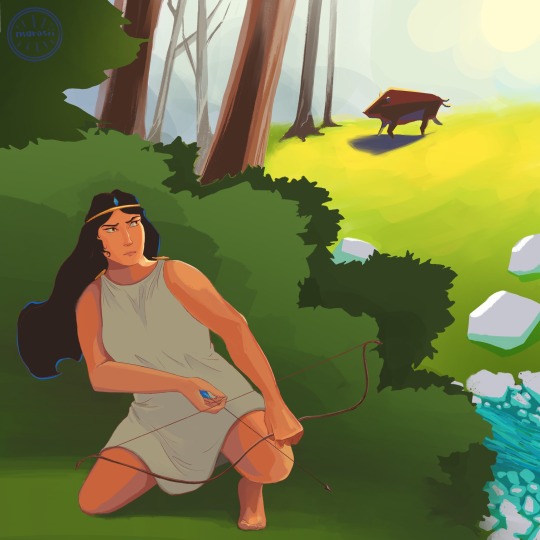
Atalanta taking on the Caledonian boar
#the fact that she’s the only woman in the hunt#and she shows every man how it’s done I just love her#Atalanta#Greek mythology#classicstober#classicstober23#tagamemnon#Caledonian boar
172 notes
·
View notes
Text
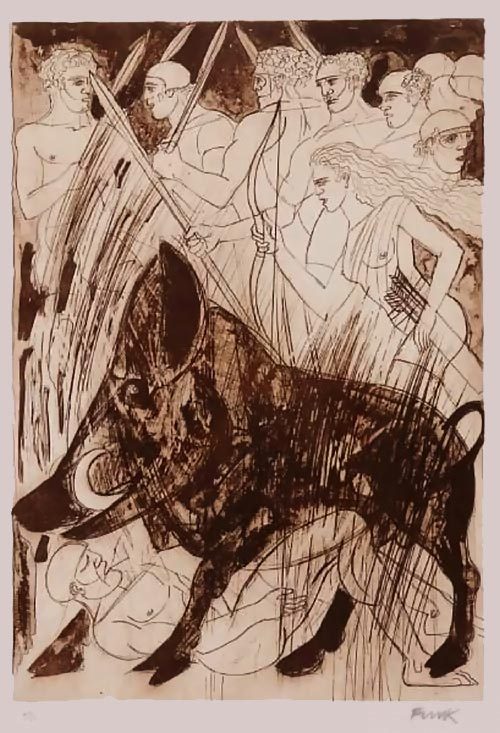
The Kalydonean Boar (1988) by Elisabeth Frink
2 notes
·
View notes
Text
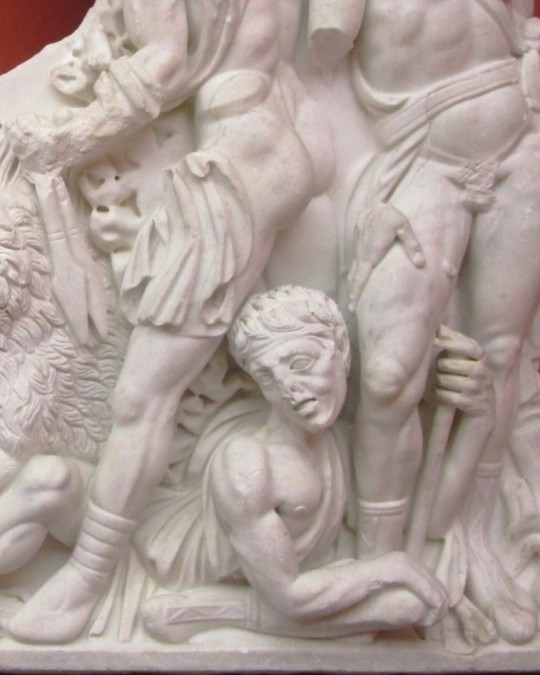
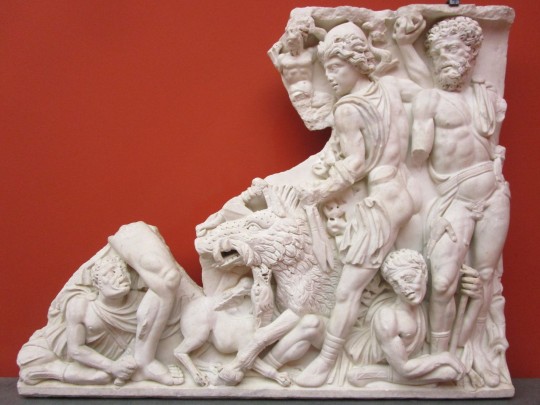
The Hunt of the Caledonian Boar - Marble sarcophagus relief known as the Meleager Sarcophagus, c. 250-270 CE
Liebieghaus Sculpture Museum, Frankfurt, Germany
131 notes
·
View notes
Note
Roman, I will forever thank you for introducing me to the mythological trans icon that is Caeneus.
Caeneus is a badass and everyone should know about him. He’s one of those Greek heroes that’s just kind of in the background everywhere. He participated in the hunt for the Caledonian boar, fathered one of the argonauts, regularly went to war with the centaurs, defended women from getting kidnapped. And he was mentioned in the Iliad as being one of the great heroes in the generation before the Trojan war. And he was generally just as respected as any other minor Greek hero. The fact he used to be a woman was mostly just a quirky part of his backstory. Only the centaurs seemed to care about that.

Two centaurs being transphobic right here
156 notes
·
View notes
Text
15 days of deity devotion: Artemis
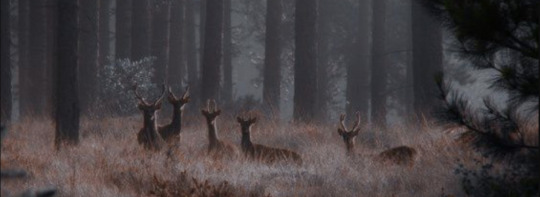
Day 1: Basic Introduction
Artemis is the goddess of many great things and incredibly important to me - and I want to use the next 15 days putting her in the spotlight she so very much deserves.
Who is Artemis?
In literature she is listed as goddess of...
the wilderness, animals & hunting; [1] includes: of the wilds, wild beasts and hunting, forest fires, lakes & springs, fishing, roads, and harbors
dawn & frost;
births, infants, children; includes childbirth, protector of the nursing infant, and protector of young girls
maidenhood & marriage;
maiden dance & song;
disease & sudden death; also includes sickness in dogs (rabies)
healing & good health;
ritual purification;
ancestral goddess and protector of the fatherland;
goddess of the Amazons and Hyperboreans. [2]
As you can see, this includes a great many more aspects than you'd expect. This does not even touch upon her connections to human sacrifice (see: Taurian Artemis), fertility (see: Ephesian Artemis), nymphs (in her retinue, along with other mortals and hunters), and many more that I will touch on these next two weeks.
Famous myths
Artemis’ mother Leto was hounded throughout her pregnancy by the jealous goddess Hera but eventually found refuge on the floating island of Delos. There she gave birth to Artemis who assisted her mother as midwife with the birth of her younger twin-brother Apollon.
Kallisto (Callisto) was a handmaiden of the goddess who Zeus seduced by assuming Artemis’ form. When Artemis discovered the girl was pregnant she transformed her into a bear and exiled her to the wilds.
The handsome giant Orion was a companion of the goddess but her jealous brother Apollon tricked her into killing him with a distant bow-shot. In her grief Artemis placed him among the stars as the constellation Orion.
When the Aloadai (Aloadae) giants tried to storm Olympus, Artemis assumed the form of a doe and raced between them, causing the pair to cast their spears, miss, and strike each other dead.
The hunter Aktaion (Actaeon) spied upon the goddess as she was bathing with her nymphs at a spring. Angered, she transformed him into a stag and had him torn apart by his own hounds.
The giant Kalydonian (Caledonian) Boar was sent by Artemis to ravage the lands of King Oineus as punishment for neglecting her in his sacrifices to the gods.
As the Greek fleet were preparing to sail for Troy, King Agamemnon offended Artemis and she becalmed the waters, preventing their departure. To appease the goddess, the king was forced to sacrifice his own daughter Iphigenia. [3]
[1]: Homer, Iliad; Homer, Odyssey; Homeric Hymn 27 to Artemis; Homeric Hymn 5 to Aphrodite; Pindar, Dithyrambs Heracles the Bold; Aeschylus, Agamemnon 140 ff; Aeschylus, fragment 188; Aristophanes, Frogs 1358 ff; Aristophanes, Thesmophoriazusae 144 ff; Callimachus, Hymn 3 to Artemis; Pseudo-Apollodorus, Bibliotheca 1.21; Apollonius of Rhodes, Argonautica; Ovid, Fasti; Seneca, Hercules Furens 406 ff; etc., etc.
[2] rest of the sources can be found here; link
[3] summary as found on theoi.com
Link to the original post by @noctivague
#artemis deity#artemis goddess#artemis worship#artemis#helpol#hellenic polytheism#hellenic reconstructionism#15 days of deity devotion#own post
168 notes
·
View notes
Text

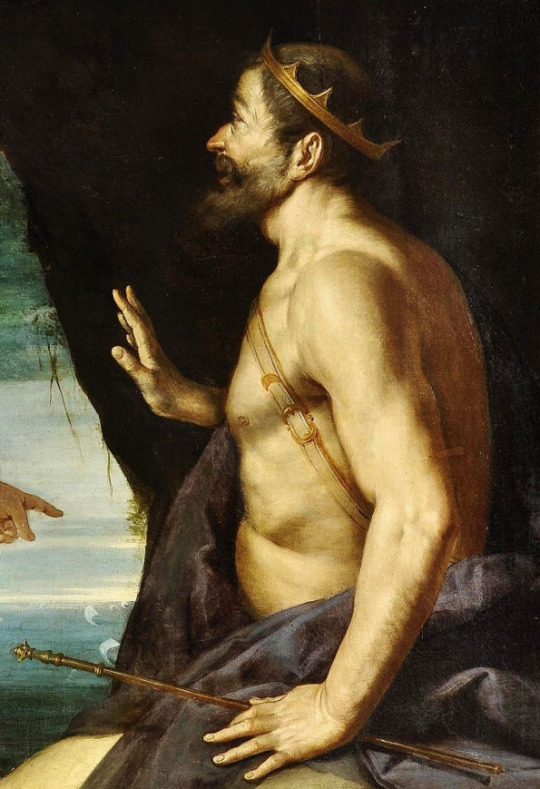
Atalanta: A huntress like Artemis herself, skilled beyond most men and powerful in the art of battle. Jason may not have thought it a good idea to let her travel with the Argonauts, but Atalanta beat Peleus in a wrestling match on her own merits and could probably take Jason as well if the little coward let her. First to draw blood on the Caledonian boar, Atalanta eventually met a lover by losing in a footrace to Hippomenes. She then got to be a lion forever, I guess.
Aeolus: King of the Winds, Aeolus tends to be a pretty chill force, allowing heroes who seek his help easy passage, but he's not a fool. Should the gods hate your guts, Aeolus isn't going to bother helping you. I'm not sure if he was ever actually a mortal or not, but he's often confused with the other Aeolus who was, so he's here representing both Aeoli, same as Minos.
23 notes
·
View notes
Text
Okay, so
Atalanta’s design in the 2014 Hercules movie.

To quote Angel Dust…
They do my girl so dirty here with this outfit cause once again this falls into the trap of prioritizing sexiness when it comes to warrior women. I’m not entirely sure if this is meant to be the actual Atalanta from myth cause they completely botch her backstory but it’s a movie about Hercules so I’m gonna treat this like it’s the “real” Atalanta.
For those of you who don’t know, Atalanta is one of the Hunters of Artemis and spent her life being raised by bears and hunters out in the middle of the Grecian forest. As such she spends very little time in actual civilization and fights with a bow and arrow. She’s also famous for slaying the Caledonian Boar almost singlehandedly.
And yet…this shows almost nowhere in this design at all. If you told me this woman grew up in the woods I probably wouldn’t believe you. The only thing that’s remotely appropriate is the armguard for the bowstring. This outfit has so many dumb choices.
Her hair is up in a ponytail of intricate braids. She grew up in the woods, why would she care that much about her hair? She didn’t spend any time around people, so hair care to this level shouldn’t even be on her radar, let a lone a priority for her.
She’s as white and unscarred as she could possibly be despite living out in the middle of the woods. She hunts for a living, there’s no way she hasn’t gotten into skirmishes with her catches before.
She has nothing but skimpy leather which does nothing to emulate a bear or protect herself in any way. Cause yeah she didn’t grow up around humans but she’s Atalanta not Eve, let her be clothed.
She’s supposed to be an *archer* yet she has abs for some reason….? If she’s running around doing archery day in and day out her body’s not gonna look slim like that. There’s been viking tombs they’ve found where there’s bone deformities from how much archery they did, her upper back should be ripped as hell.
And the boobplate…..the fucking boobplate 😑😑😑 Sorry but boobplates need to keel over and die already, the only purpose they serve is showing a character has boobs. 
If you’re gonna design a look or outfit for a character like Atalanta, it should very obviously emulate her wildness and feral nature to reflect her upbringing. Let her actually feel like a bear in human’s clothing.
Take Disney’s Tarzan for example.

Everything about this design says “person who grew up in a wild jungle”. He wears little clothing so he can run around in the hot humidity, he keeps his hair almost completely loose and unkept. And even his very body, yeah he’s kinda ripped but he’s not Chris Hemsworth ripped. He’s still very lean and scrawny looking. He looks like a gorilla in a human body almost.
Why not do the same for Atalanta? As a bear lady she could be wearing furs all over that she sewed into clothing herself-heck she could even be wearing the hide of the boar she slayed- so she actually looks like a bear. She should keep her hair in a simple style, either really short or just tied up in a basic ponytail. Let her have scars all over her body to show that she’s gotten in some nasty struggles. Let her be super thick to give her the mass of a bear. Let her have wood for basic armor instead of any kind of metal
4 notes
·
View notes
Note
Would you ever let WALL-E help clean up the underworld for you?
"Whoever or whatever cleans up the Underworld is below my paygrade. As long as the place doesn't become a Caledonian boar-sty, I couldn't care less."

5 notes
·
View notes
Text
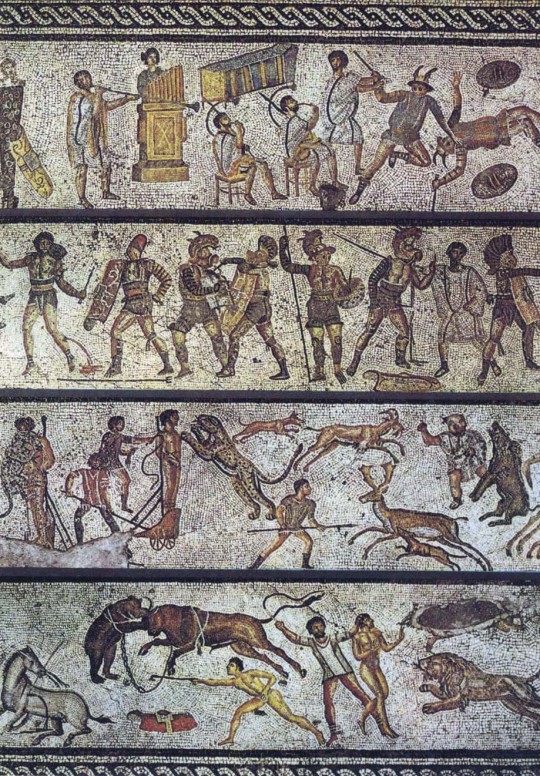

Executions as Mythical Re-enactments
Warning: This chapter contains graphic descriptions of violence.
A particularly gruesome form of execution involved making the condemned criminal play a role in a mythic re-enactment. A form of this was inflicted on the bandit Selurus, who was brought to Rome and executed on a wooden platform made to look like Mount Aetna:
And recently, in my own time,[1] a certain Selurus, called the “son of Aetna,” was sent up to Rome because he had put himself at the head of an army and for a long time had overrun the regions round about Aetna with frequent raids; I saw him torn to pieces by wild beasts at an appointed combat of gladiators in the Forum; for he was placed on a lofty scaffold, as though on Aetna, and the scaffold was made suddenly to break up and collapse, and he himself was carried down with it into cages of wild-beasts — fragile cages that had been prepared beneath the scaffold for that purpose.
Strabo, Geography 7.2
The poet Martial records several far more elaborate executions in his Book of Spectacles (originally written for Titus’ games for the opening of the Colosseum, he revised it and it was presented to Domitian in 81 CE).
V Believe that Pasiphae was mated to the Cretan bull: we have seen it, the old-time myth is now believed![2] And let not long ago time, Caesar, marvel at itself: the arena makes real for you whatever Fame sings of.
VII Just as Prometheus[3] chained on a Scythian crag fed the untiring vulture with his too prolific heart, so Laureolus,[4] hanging on a real cross, defenceless gave up his guts to a Caledonian bear. His mangled limbs lived on, though the parts dripped gore, and in all his body there was nowhere a body’s shape. He finally won a deserved punishment: the guilty man had cut a parent’s or a master’s throat with his sword, or, in his insanity, had robbed a temple of its piled up gold, or had secretly set a savage torch to you, Rome.[5] Accursed, he had outdone the crimes ancient legends tell told; in him that which had been a show before was punishment.
VIII Daedalus, now you are being mangled by a Lucanian boar,[6] how you wish you now had your wings!
XVlB A bull carried Europa along fraternal seas; but now a bull has carried Alcides[7] to the stars. Compare now, Fame, the bulls of Caesar and of Jupiter: the burden was the same, yet Caesar’s bull threw his higher.
XXI The arena has shown to you, Caesar, whatever Rhodope saw, it is said, on the Orphic stage.[8] Cliffs crept close and a marvellous wood moved swiftly on, one such as men think the grove of the Hesperides was. Every kind of wild beast was there, mixed in the herd and above the Orpheus many birds hovered – but he fell, mauled by an ungrateful bear. This was the only thing which did not correspond to the legend.
XXlB When the earth yawned suddenly and sent out a she-bear to attack Orpheus, the bear came from Eurydice.[9]
XXV Stop wondering that the night-time wave spared you, Leander[10] – it was Caesar’s wave.
XXV B While bold Leander was swimming to his sweet love and his weary head was now being engulfed by the swelling waters, in misery (or it is said) he spoke to the surging waves: ” Spare me while I go to her, overwhelm me when I return.”
XXVI A trained bevy of Nereids played along the sea and danced on the yielding waters with their varied arrangements. A trident threatened with straight spikes, an anchor with a curved one: we thought we saw an oar, and we thought we saw a boat, and that the Spartan[11] star glittered in welcome to the seamen, and sails filled wide for all to see. Who imagined such marvellous art in liquid waves? These pastimes either Thetis taught or learned herself.
Martial, On Spectacles
Not all re-enactments involved Greek myth: some also involved people playing the role of figures from Roman legend as in the following poem about a criminal being forced to play the role of Gaius Mucius Scaevola, a legendary Roman who thrust his hand into a sacrificial fire after being captured by Rome’s enemies when on a mission to assassinate the enemy leader: he did this as a way to show them how little Romans valued their lives or cared about pain:
Mucius Scaevola
The spectacle which is now presented to us in Caesar’s arena, was the great glory of the days of Brutus. See how bravely the hand bears the flames. It even enjoys the punishment, and reigns in the astonished fire! Scaevola himself appears as a spectator of his own act, and applauds the noble destruction of his right hand, which seems to luxuriate in the sacrificial fire; and unless the means of suffering had been taken away from it against its will, the left hand was still more boldly preparing to meet the vanquished flames. I am unwilling, after so glorious an action, to inquire what he had done before; it is sufficient for me to have witnessed the fate of his hand.
Martial Epigrams 8.30
If that Mucius, whom we recently saw in the arena in the morning, and who shoved his hand into the blaring fire, appears to you to be a man of patience, fortitude, and endurance, you have no more sense than the people of Abdera; for when a man is commanded, with the alternative of the pitched shirt before his eyes, to burn his hand, it would be more courageous to say, “I will not burn it!”
Martial, Epigrams 10.25
Tertullian raged[12] against these mythic re-enactments (along with other things, such as farces)
Others of your writers in their depravity even amuse you by vilifying the gods. Look at those elegant writings of your Lentuli and Hostilii, whether in the jokes and tricks it is the mimes or your gods which make you laugh, [writing likes] Anubis the Adulterer, and Mr. Luna,[13] Diana Whipped, and Reading of the Will of Jupiter Deceased, and Three Mocked and Hungry Herculeses. Your dramatic literature, too, depicts all the sins of your gods. The Sun mourns his offspring cast down from heaven to your pleasure; Cybele sighs after the scornful shepherd without a blush from you;[14] you tolerate Jupiter’s misdeeds appearing on stage, and the shepherd judging Juno, Venus, and Minerva.[15] Then, again, when the face of one your gods sits on a disreputable and infamous head, when an impure body of someone and up for the art in all effeminacy represents a Minerva or a Hercules, is not the majesty of your gods insulted and their deity dishonoured? Yet you not merely look on, but applaud. You are, I suppose, more devout in the arena, where after the same fashion your deities dance on human blood, on the pollutions caused by inflicted punishments, as they act their themes and stories, doing their turn for the wretched criminals, except that these, too, often put on divinity and actually play the very gods. We have seen in our day a representation of the mutilation of Attis, that famous god of Pessinus, and a man burnt alive as Hercules. We have made merry amid the ludicrous cruelties of the noonday exhibition, at Mercury examining the bodies of the dead with his hot iron; we have witnessed Jupiter’s brother, mallet in hand, dragging out the corpses of the gladiators.[16] But who can go into everything of this sort?
Tertullian, Apology 15.4-6
Media Attributions
Mucius Scaevola © Photo by Jastrow is licensed under a Public Domain license
c. 35 BCE. ↵
Pasiphae was the wife of Minos, king of Crete. As a punishment to Minos she was forced to fall in love with a bull by the god Neptune. She mated with him after the craftsman Daedalus built a hollow wooden cow for her to hide in. The child of this union was the Minotaur. ↵
As a punishment for stealing fire and giving it to mankind, Jupiter chained the god Prometheus to a rock; every day a vulture ate his liver, which grew back in the night. ↵
He was a legendary Roman bandit; there was a mime named after him ↵
Arson was considered a particularly heinous crime in Rome because of the great amount of damage it could cause. ↵
Lucania is a region in the South of Italy; densely wooded, it was known for its wild boars. ↵
Alcides = Hercules. Europa was a princess who was abducted by Jupiter in the form of a white bull; he carried her from Asia to Crete. ↵
The mountain of Rhodope in Thrace was associated with the mythical poet Orpheus, who was said to be able to charm wild animals with his song. In this re-enactment it seems as if a condemned prisoner was made to play the role of Orpheus, eventually being mauled by a bear. ↵
It is likely that XXI and XXIB were originally parts of the same poem. Eurydice was Orpheus’ wife, whom he tried unsuccessfully to rescue from the underworld. ↵
This and the following were part of a naumachia, rather than an event in the Colosseum. Part of the show was presumably someone representing Leander re-enacting his mythic swim across the Hellespont to his beloved Hero. ↵
The stars of Castor and Pollux, gods worshipped by sailors. ↵
I suspect that at least 50% of Tertullian’s waking hours were spent raging about something. ↵
The moon goddess, Luna, was not usually a man. As might be guessed by the fact that she was a a goddess ↵
Attis; he was a shepherd who was driven mad as a punishment by the goddess Cybele. In his madness he castrated himself, the mutilation that Tertullian is referring to. ↵
A reference to the Judgment of Paris, where the shepherd Paris gave the Golden Apple as prize to Venus after she’d promised him Helen of Troy. ↵
In the arena there was a person dressed up as Pluto, god of the underworld and Jupiter’s brother, who hit the corpses with his mallet to make sure they were dead and dragged the corpses out with a took. ↵
Previous/next navigation
Previous: Damnatio ad Bestias
Next: Executions of Christians
0 notes
Text
Authors Notes:
1. [Hello! My brain wandered itself on a very wonderful adventure!
It starts in the Galápagos Islands, with a little songbird holding a stick in its beak. It is not a castaway New Caledonian crow, or any corvid, or even parrot. It is a tanager.
Along the way, the story dwells with beavers and passes by the predators of Yellowstone. The journey’s end left me adrift in space, feeling alone, yet feeling haunted by the idea of what might one day view me as company.]
2. [I’ll stew over the conclusion and, after a few day of pondering, either seem my conclusion is worth considering, or realize fatal flaws in it and thus accept it as a fun story I told myself.
But I can’t wait until then to share it :3
So here is my adventure! Unedited, uncertain, unprepared, the exact way I experienced it :3 ]
:readmore:
Whoaaaa
So you know that some corvids are famous for using tools? (A lot of documentaries on animal intelligence features corvids, especially the hook-making New Caledonian crows.)
There’s another bird known for using sticks in a similar way! It’s not even a corvid :0 or a parrot :0
It’s. A. ~Finch~
They happen to share the exact same niche with New Caledonian crows—and, importantly, woodpeckers!
Woodpeckers are kinda funny because you don’t see many animals use their brain-casing as a jackhammer, for reasons such as “brains are not designed to be impact weapons.” They evolved some fun anatomy that reduces the impact—they’re fine. They are so fine, in fact, that they developed a social communication based on their ability to peck wood. And they are so good at eating bugs in wood! They are so specialized for it, and they’re found almost worldwide, because anything specializing in “can get secret snacks out of the trees” is going to find food wherever it goes—even if it learns to work with cactus.
Where aren’t woodpeckers? New Caledonia. And other nearby Australasian places. And also, one very distant place, on the other side of the Pacific Ocean: The Galápagos Islands!
With no woodpeckers, wood-living bugs are an untapped resource (pun intended)! And the Galápagos Islands are a famous example of the power of empty niches. Galápagos finches perfectly display the way a single type of finch evolved to fill many specific niches available, with their beaks evolved for highly specific purposes such as seed-cracking, insect catching, etc etc.
But they didn’t evolve to jackhammer their way into the wood! The anatomical and physiological changes just didn’t evolve—not before another strategy filled the niche. The ‘woodpecker finch’ uses tools, and never evolved to use their beak to peck wood.
The same is likely the cause for New Caledonian crows learning to use tools! The same untapped niche—one off the coast of South America, and one near Australia—allowed a species to develop the cleverness needed to bypass the evolution of specific anatomy!
Isn’t that COOOOOL 😍 Social* creatures, like corvids, parrots, dolphins, primates, etc, benefit a lot from having a detailed memory and problem-solving skills. They survive better if they remember how everyone behaves and who will share their resources. Knowledge becomes hereditary, not by sexual reproduction, but by observation and imitation. They can develop non-intuitive communication from abstract signals.
*speaking colloquially. Eusocial creatures not necessarily included.
So it isn’t as surprising when a social creature discovers a tool. They have memory and problem solving skills. Birds and dolphins have a leg-up for spatial comprehension (arboreal animals, such as primates, may similarly have a distinct comprehension of 3D spaces, but humans have very explicit shortcomings with that skill.) because they navigate a 3D space, unlike many terrestrial animals (such as a turtle or a boar), which rarely need to think of the world beyond a 2D plane.
But the Galápagos finches learned to use tools! In that fascinating island chain, where nature accidentally conducts semi-controlled experiments due to isolation, the Galápagos finches developed to use tools, not their face.
If this were an experiment done by a human, the data would be inconclusive until accuracy and precision established validity via repeat experiments. It is, after all, just a single example of a non-social species developing tool-usage.
But how exciting, that it happened at least once! At least once, intelligence was easier to evolve than physical adaptations! Is this why humans are so -bare- in terms of physical capabilities? We aren’t exactly strong nor weak, not aquatic nor entirely terrestrial, not adapted to extreme heat or cold or specific diet. We are almost wonderfully generic! Ready to wear clothes or hold a spear or invent rope or boats or cultivation of food!
And a mesmerizing thought takes up residence in my brain. I find myself dwelling on the ecological damage experienced when a keystone species is removed. If beavers ceased to exist in North America, eventually their dams would break and lakes would revert to rivers and tons of lake-specific species would perish (or evolve fully into other niches, rendering their lake-dwelling species extinct).
Dam-building has only evolved once as far as I know—in beavers. No other animal carves up entire regions and creates biomes as part of its survival.
Except humans lol. Animals can deplete or destroy a biome, but it isn’t intended, and they do not create new biomes for their own benefit—not within one lifespan, anyways. It is common for a species to develop the behaviors needed to maintain, expand, or contribute to their biome. Big cats and small cats hunt even if they are provided food, which provides organic matter to several levels of their own food chain, supporting bacteria and fungus that will go on to support small animals and then larger ones; and supporting larger decomposes that either feed into the higher levels of the food chain or provide crucial disease-management (vultures are wonderful at this). But it’s rare for an animal to have so much power, that a single individual is can usurp one biome for the sake of creating their own ideal biome. Termites build mounds, but a single termite can’t. Buffalo grazing tends to their habitat, but a single buffalo can’t create a plains biome to support its progeny. But a beaver can throw together a dam and birth an entire lake over the previous biome and create a habitat that might be maintained for generations.
If beavers vanished, it would be a miracle for another species to adopt their niche. Rather than filling a specific niche, they construct their own. But, many other keystone species simply occupy a niche they stumbled upon and then specialized in. The niche of the Yellowstone wolves was never filled, but in the right conditions, would mountain lions have developed large social groups, filling the same niche as African lions? If pollinator species go extinct, there is a slight chance of another species taking on their role—but it would have to evolve quickly, within a fraction of the lifespan of the plant involved, before the plants became doomed by reduced genetic variation and population isolation.
I think that specific niches can be inherited by different species, even if it seems impossible for a different species to convergently evolve the same adaptations, through a route I’ve never considered before: evolution of intelligence. If the case of the finches isn’t a virtually impossible outcome, then it means that evolution of intelligence can be favored over physical adaptations—and it means that intelligence is not virtually impossible to evolve.
It means that intelligence is an inevitable consequence of evolution.
What is definition of “life?” I propose a new definition, one that is functional rather than categorical. “Life” is something that adapts (not just acclimates) to the space around it. It can build upon these adaptations, accumulating adaptations as the environment either continues exerting its constant pressure or as the environment changes to exert new pressure, and become more specialized for a specific strategy of continued existence.
I propose this definition is valid, because it contains all the components required for the inevitable evolution of intelligence.
Hauntingly, I am forced to reconsider my self-soothing belief that viruses are not living. Rather than debating the definition of “genetics” and “inheritable” and “metabolism,” my definition is honed on one single thing:
Could this thing become sentient?
0 notes
Text
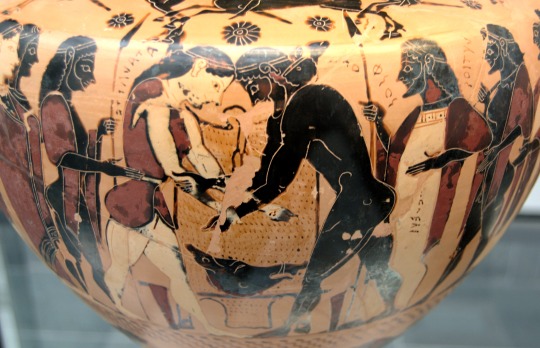
Hydria detail: Wrestling of Atalanta and Peleus for the funerary games of king Pelias
* Chalcis
* 540-530 BCE
Attribution: Staatliche Antikensammlungen, Public domain, via Wikimedia Commons
#Atalanta#Peleus#6th century BCE#ancient#Greek#vase#hydria#art#detail#sports#Caledonian boar#Chalcis#clothing#state collections of antiquities munich
92 notes
·
View notes
Text
I am but a humble denizen of Ancient Greece attempting to make my yearly sacrifice to the gods but I forgot to sacrifice to @flashflashitsash @misscongenialityofmlb and @lalunaoscura and now they are sending the Caledonian boar to ravage my lands for my hubris
42 notes
·
View notes
Photo

This is how I imagined Atalanta, the huntress who killed the Caledonian Boar
2 notes
·
View notes
Note
/roleplay I agree that Quackity is without a doubt, power hungry. I actually think that he is going after Dream not because he is like Tommy who just wants to stand against Dream but because he is afraid. He is afraid of Dream but at the same time, he is so damn envious of him. He wants that kind of power and control too. As much as he wants to dress it all up, Quackity crave power and authority. So, how do you think Festival 2.0 is going to go? Especially the reactions from Dream Team?
Okay first: I think you're spot on about quackity there!! Second: ty so much for asking this bc I have thoughts!!! Under the cut, because my thoughts are long as fuck. (Reminder that this is all rp, bc I'm too lazy to put c! In front of every character name in this post)
Note: for the purposes of this post, everyone who sided with Dream during the L'Manburg Massacre + the Badlands is "Dream Team", soley because I want to talk about Bad, Puffy and Punz too.
First: tommy teaming with Techno is going to cause some strain between Techno and Dream. (I'm very sad about this, because I absolutely love the concept of Dream & Techno as a chaos-causing pair and would love to see more of it.) This is going to cause strain because of the whole thing with tommy not liking to think about Dream, Dream repeatedly trying to blow up tommy, all that drama between those two with the fact that tommy now has extremely mixed feelings on Dream and is soley going after the discs now, which Dream has opposed him on the whole time.
This limits their ability to team up during this festival 2.0.
Second: I think tubbo is a lot more traumatised by the festival than he wants to admit. The fact that he didn't just kill Techno, he specifically tried to have him publically executed, and the fact that he's now also trying to recreate what happened to him in order to kill Dream and Techno is very very telling. This,,, generally isn't great, because a lot of people (I'm thinking mainly Niki, Ant, Eret etc, those who were pretty negatively effected at the festival) are going to have very bad reactions to the whole idea of a festival in the first place, even without knowing it's a front for the murder of Dream and Techno. Additionally, with Ghostbur remembering some,,, interesting things on Phil's stream this morning, there might be some Ghostbur drama!
Third: we've got to remember they're trying to kill god here. Dream is assumed to be the god of the smp, with his ? canon remaining lives, the fact that his only known canon death was a /kill on himself & Quackity's whole conversation with a drunk Wilbur, in which he apologized to Dream while calling him god in VC with Wilbur, which is obviously at best debatably canon, but confirms Techno's joke about the chest Dream gave him being "a gift from god".
Fourth: theseus! I'm sorry, I'm a classics major, I have to talk about this. So Techno was right at the festival but I'm just gonna give a slightly bigger version of the story here.
Theseus was the son of Aegeus, the King of Athens, and every year, Athens had to send young men and women to Crete, to fight the Minotaur. Theseus eventually went himself, promising his father that he'd switch out the sails on the boat that returned to Athens with the bodies of the Athenian youths so that his father could know he returned alive. Theseus went into the Labyrinth, and with the help of Ariadne (the daughter of Minos, the King of Crete) Theseus killed the Minotaur. He returned home, forgot to switch out the sails, and in his grief, Aegeus threw himself off the Acropolis. Then there were a few more adventures, including a battle with the Amazons, the Caledonian Boar Hunt (featuring one of my all-time favourite heroes, Atalanta) and an attempted rescue of Persephone. Eventually, he came back to Athens, where he almost immediately got overthrown and exiled. He takes shelter in Scyros, but the king of Scyros, Lycomedes, kills him.
This myth is really interesting in the context of the dream SMP for a few reasons!! First: who takes the place of Aegeus? Is it Phil, tommy's father? Is it wilbur, who's already canonically committed suicide? Is it tubbo, who thinks that tommy is dead? Second: Techno will take the place of Lycomedes. He owes Dream at the moment, for both the totem of undying and the save at his execution, and Dream is really not the biggest fan of tommy right now. Or like, ever. Additionally, Techno's already shown that he'll cave to peer pressure because of the festival, so if Dream asks, Techno will probably do it.
Back to festival 2.0, with dream team reactions this time! Badlands will be interesting. I honestly don't know if they'll even turn up, considering the whole red vines thing they've been dealing with. If they do, and tubbo successfully takes one of Dream's infinite fucking lives, I think Puffy would be pretty horrified, given that she's shown to consider Dream a mildly creepy baby duckling & appears to be generally fond of him. I really can't tell with George and Sapnap at the moment, but I think it might be a relatively violent reaction. Last I heard, they think Dream doesn't care about them & the trio appears to be splintering slightly, which is heartbreaking, but I think no matter how they pretend otherwise, they still care about Dream. Punz, I think, will start murdering people, which is always fun.
For tubbo, though, this festival is really leaning into the whole "Schlatt 2.0" thing. I think he might start drinking (illegally) because of the whole "thinking tommy is dead" thing, and/or he'll lose his last canon life at the festival.
I hope this answered your question? I know I started rambling a little bit, ahaha.
#answered#anonymous#dream smp#dream smp spoilers#long post#the queen's commands#quackity#dream#technoblade#tubbo#tommyinnit#dream team#im sorry i started infodumping
39 notes
·
View notes
Text
The Fall Of Icarus

Ovid tells the tales of Theseus and the Minotaur, Daedalus and Icarus, the Caledonian Boar-Hunt, and many other famous myths. One of the iconic moments in this book is when Icarus flies too close to the sun leading to his wings being burned away and he falls to the ground. An idea i could use as a project relating to this theme is someone spiralling into madness mentally.
2 notes
·
View notes
Text

If there was ever a good place to pick up bad habits – it was Ancient Rome.
When Aziraphale arrived in Rome, he hadn’t actually eaten anything in about a century. No, that’s a fib; he’d eaten a bowl of goat curry on a high-altitude outpost in the Himalayas, and a side of boar bought somewhere in Gaul after narrowly avoiding a discorporation, and he could remember both of those meals with a depth of detail that was truly remarkable. So, not nothing, but not very much, not since he sent in his report about the Caledonian assignment.
The painstaking project of establishing a chosen family as a prosperous local influence was one that had gone rather well, actually, and he’d submitted his lengthy report with the hopeful expectation that Head Office would be pleased with him for once. He couldn’t have been more wrong. Michael was in his room not three hours after the report got sent up.
‘Three meals a day?’ she’d demanded icily, without preamble, holding the document aloft between a rather disdainful forefinger and thumb.
‘Er,’ Aziraphale had answered, recovering the unlit tallow candle he’d dropped on the ground in surprise when she manifested. ‘Yes. The humans really rather – ’
‘And you didn’t think that was disgusting?’ continued Michael, with dangerous calm.
‘Well… no,’ said Aziraphale, painfully aware that this was the wrong answer. Not that he’d known about it before now. He’d fallen into the pattern by accident, mostly, trying not to be too conspicuously inhuman while settling in to spend a decade with a close-knit tribe. Then it had become apparent just how much the pattern humanised him to his marks. So he’d embraced it. ‘Actually, it helped a great deal with the assignment, so I thought I’d include it in the report as a sort of – as a tip. They really listen to you, when you eat with them. The same way they listen to each other.’
Michael still looked calm. It still felt dangerous. She lifted an eyebrow.
‘You’re saying you want us to recommend that other angels do this kind of thing?’
‘Oh. Recommend is rather strong. I only meant it as a, as a, as an observation. In case anyone else might find it helpful. I just thought… well, as the only angel permanently stationed on Earth, I thought – ’
‘You’re the only angel permanently stationed on Earth,’ Michael took over, ‘so it’s inevitable you’ll be forced to do unpleasant things from time to time. For appearances’ sake. But it’s disturbing that you no longer keep degrading behaviour like this to a minimum, Aziraphale.’
‘Oh,’ he said again, nonplussed. ‘I see.’
To tell the truth, he was rather embarrassed at the discovery that he might have been blithely committing misconduct all this time. He wasn’t quite sure whether this policy against eating was new, or if he just hadn’t known about it before now, but it didn’t seem wise to ask Michael, in case it turned out to be the latter. (Come to think of it, there had been quite a number of times recently when his superiors had dropped in on him while he was eating. He’d found this disconcerting, but hadn’t thought the pattern was intentional. Now he wondered if it was a hint, and he missed it. Oh dear.)
Nor did it seem wise to ask whether the policy had really come from the Very Top. That might seem impertinent.
So he asked no questions.
Michael went on:
‘Luckily for you, I’d rather turn a blind eye than write out a reprimand for something so vulgar, but I must remind you informally: the more you stain yourself down here, the harder it will be to clean off.’ For a moment it seemed like this was all she had to say, but then she closed her eyes and adopted a perfectly revolted expression. ‘And, Aziraphale. Whatever you have to do to get by on this job… for the love of God, don’t make me read about it.’
Then she disappeared from his room without a farewell, as if unable to stand the sight of him for another second.
So, Aziraphale stopped eating.
This decision turned out to be less straightforward than he expected. Later on, he would struggle to remember when, exactly, the attempt to eat less had evolved into an outright ban. He just knew that it had proved worryingly difficult.
He’d simply never had to think so much about food before. It had always been a part of the job, of course. Not the most disagreeable part, either. He worked with humans, and their social practices made it inevitable that an affable, human-looking sort would get offered food fairly often, if he was hanging around them enough. If it was expedient, or pleasurable, to say yes – Aziraphale would say yes.
It was after Michael’s visit that he first encountered hunger, a feeling angels are not supposed to know. He’d always been able to go months without eating, during long journeys and famines and floods, and never experienced any discomfort. Now, for the first time, when someone offered him food, he had to remind himself to say no, even when it would have been expedient or pleasurable to accept it. And this made him notice something altogether new. Every time he said it, an unfamiliar something tugged at a spot in the middle of his chest. Not a painful tug, exactly, but there. Sometimes, difficult to ignore.
He observed this change in himself with concern. The more you stain yourself down here, the harder it will be to clean off. He’d never accepted so much food as he did in that little Caledonian village, never allowed his corporation to settle into a rhythm of predictable eating before. Clearly, doing so had left a lasting impression.
And why hadn’t he given it any thought? How had he not realised the other angels would be disgusted by it? He’d eaten so much he’d had to go to the midden every day, like a human, not just to pass water but the other thing – oh, goodness. And he’d told Michael about it. No wonder she had been upset. Aziraphale might as well have sent her a long description of his defecation habits.
When this thought dawned on him he went cold all over, and then he couldn’t seem to get it out of his head. It would come back to distress him several times a day, always at very inconvenient moments, and so intensely that he would draw alarmed looks from nearby humans as he groaned aloud and banged his fists on his forehead.
Not to mention the torture he went through after dark. He’d wasted plenty of nights worrying about his professional missteps, of course, but for some reason this humiliation crawled right under his skin in a way his previous errors had not. Aziraphale would go over and over and over the whole incident in his mind: what Michael must have thought when she read the report, what she must have said to the other archangels, whether they had laughed about him, what they now knew. Worrying about it was futile and painful and childish, and soon he was doing it every night without fail, robbing himself of his usual hours of privacy and peace. Just one more lasting consequence to his thoughtlessness. Along with this new need, this hunger.
Still, lasting didn’t have to mean permanent. He had trained himself into it, so he must be able to train himself out of it again. It wasn’t that he planned to avoid food forever. Only until the problem was fixed. If he fought it for long enough, surely, the hunger would go away.
Aziraphale waited to find out how long this would take. The answer certainly wasn’t ‘a short time’. In fact, the more time went on, the harder that something seemed to tug. Soon it was happening not just when he had to say no, but also when he heard others saying yes, or when he passed a group of humans eating together, or when he thought for too long about food. After a decade or so, the tug had become so insistent that occasionally, when someone started enjoying a meal in his vicinity, he would have to simply walk away, because the sight of it was more than he could stand.
But he didn’t give up on the idea of re-training himself. If anything, he felt more committed. His increasing discomfort only underlined the importance of getting rid of the hunger, and resisting it was relatively easy, if not very enjoyable, during that first century. Aziraphale faced little in the way of temptation, in most of the places he passed through. Head Office kept sending him to dusty little villages and remote backwaters, where people had so little that they couldn’t afford to offer any part of it to guests, and that meant there was more than one good reason to turn it down if they did. He got thinner, and people started trying to give him food more often. He miracled himself to look fuller, so they wouldn’t.
He felt pleased with himself, really. He didn’t know when the tug would go away, if a hundred years wasn’t enough, but now he knew how to ignore it, and that meant he could wait as long as it took, until it did.
And then Aziraphale walked into Rome.
Rome where they had just discovered dining culture, and takeaways, and celebrity chefs. Rome where all his wealthy marks flaunted the fact that they had far more to eat than they needed, where guests were routinely greeted by slaves with platters, where restaurant doors were flung open and street vendors sizzled their wares on the street and the scent of it was everywhere you went, like Gomorrah all over again.
Heaven hated them, these big cities, where they drank and danced and touched and ate. Aziraphale tried not to go into them, because of how much he liked them and how much Heaven hated them, but in the end he got an assignment that meant there was absolutely no avoiding the place that was currently the epicentre of everything, so he walked into Rome.
Aziraphale went almost a clean century without eating anything, and then he walked into Rome, and he could not think about anything except food.
(To be continued...)
#good omens#eating disorder cw#WIP wednesday wahoo#sorry it's such a long extract but that's how i roll#hnergh it makes me nervous to post this#aziraphale is hungry tag
28 notes
·
View notes